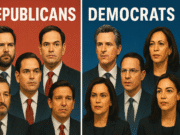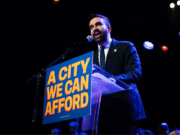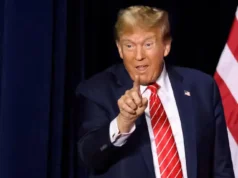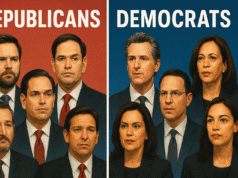WASHINGTON—President Donald J. Trump’s march toward a return to the White House, has dramatically transformed his sprawling business empire. As revealed in a report published in the New York Times, it is shifting away from traditional real estate development toward cryptocurrency ventures and international licensing deals. The pivot comes amid mounting legal judgments, falling revenues from legacy properties, and a sharp decline in cash reserves just a year before his 2024 Republican nomination.
Report further says, “According to a review of thousands of internal documents filed in the New York civil fraud trial against the Trump Organization, Trump’s finances were under extraordinary strain in 2023. Despite boasting in testimony that he had “between $300 million and $400 million” in cash, records show that his liquid assets had dipped as low as $52 million in 2018, and recent liquidity was largely due to a $150 million+ payout from a passive investment, not business profits.
At the time, several of Trump’s signature properties were faltering:
40 Wall Street, his office tower in Lower Manhattan, was 25% vacant, generating $2 million less per year than needed to cover its mortgage.
The atrium of Trump Tower, once filled with high-end retailers like Cartier and Asprey, now features Trump merchandise kiosks and a shuttered marble water wall covered by an American flag.
The Trump International Hotel in Washington, sold for $375 million in 2022, resulted in a net gain of only $79 million—far short of the $100 million invested—after the buyer defaulted on a $28 million loan from the Trumps.
At least half of Trump’s 14 golf courses reported negative cash flow in multiple years, with losses driven by underperformance and overspending. In 2017 alone, the organization spent $13 million more than planned on course maintenance while bringing in $15 million less than projected.
Legal liabilities added further pressure. In total, Trump now faces over $600 million in judgments:
$355 million in the New York civil fraud case (with $175 million in cash posted for appeal)
$88.3 million in damages owed to writer E. Jean Carroll (with $97 million in cash and bonds posted for appeals)
A potential $100 million IRS audit liability, which appears unlikely to be enforced under the current administration
A Business Rebranded
Amid these challenges, the Trump family found a new business model: monetizing the Trump name through crypto, social media, and international real estate partnerships—often with little to no capital investment.
Trump has personally invested nothing in Trump Media & Technology Group, the parent of his Truth Social platform, yet owns more than 50% of its stock, currently valued at $2 billion, despite the company generating only about $1 million per quarter in revenue.
The Trumps’ ventures into cryptocurrency have proven even more lucrative:
In partnership with World Liberty Financial, Trump family members received crypto tokens worth at least $236 million, according to blockchain analytics firm Chainalysis.
The sale of Trump-themed memecoins has generated $320 million in revenue, with fans purchasing collectible digital tokens as part of fundraising efforts.
Meanwhile, licensing deals surged after Trump secured the Republican nomination. Since late 2023, the Trump Organization has announced nine new international projects, including:
Two real estate ventures in India and Deals in Vietnam, Serbia, and across the Gulf States, including Qatar, Dubai, Riyadh, and Jeddah.
Some of these deals reportedly include upfront payments of $5 million each, compared to the $750,000–$1 million licensing fees typical during Trump’s “Apprentice” years. Many of these partnerships are with longtime allies of the Trumps, including Kalpesh Mehta in India and Ziad El Chaar of DarGlobal, a Saudi-affiliated construction firm.
Trump’s personal involvement in crypto policy also raises serious ethical questions. As president, he is both a partner in crypto ventures and the chief U.S. regulator of digital currencies. Critics argue this creates an unprecedented conflict of interest.
“These deals allow people to funnel money to the president in ways that are opaque and virtually untraceable,” said Noah Bookbinder, president of Citizens for Responsibility and Ethics in Washington.
Decline of Traditional Real Estate
Despite a few high-profile developments, Trump’s original identity as a real estate magnate has largely faded. His most profitable resort, Trump National Doral in Miami, was purchased and renovated for $379 million but appraised at just $297 million in 2021. Internal records revealed that Trump’s polarizing public image had depressed bookings for six consecutive years.
Though the Trumps received zoning approval in January for a massive 1,500-unit condominium project on the Doral property, Trump testified that he was not actively looking to build, saying he might “leave it for the kids or sell it to another developer.”
Even properties that were once top performers, like the Chicago Trump Tower, remain underused. A 70,000-square-foot retail space has remained empty for 16 years due to its low visibility and below-street-level design.
The New Trump Business Model
What once was a real estate development empire has now become a high-profit branding and digital enterprise, heavily reliant on Trump’s political relevance and fan loyalty.
As of now, this strategy has proved effective: in June, the Trumps paid off a $115 million mortgage on 40 Wall Street, a building previously at risk of default due to underperformance. Recent cash inflows from licensing, media, and crypto likely enabled that payment.
Whether these new ventures can sustain Trump’s empire—or stand up to future legal or political scrutiny—remains to be seen. But one thing is clear: Donald Trump’s business model in 2025 is no longer about skyscrapers, but about influence, identity, and monetizing the presidency itself.







































